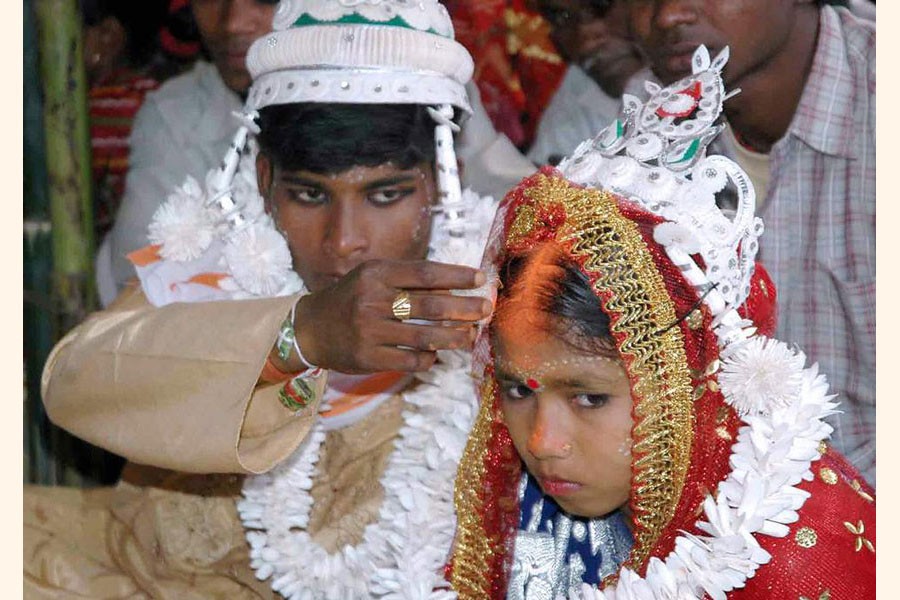One in every five girls in the world marries before the age of 18. Each year 12 million child marriages (marriage before the age of 18) take place worldwide. A study shows that women who got married before the age of 18 have 23 per cent greater risk of suffering from diseases including heart attack, diabetes, cancer and stroke. Even, they have a higher rate of sexually transmitted infections (including HIV). Early marriage is associated with higher death rates of the mothers resulting from malnutrition, unwanted pregnancy, abortion and child birth.
Ending child marriage is a major issue on the development agenda for Bangladesh as well. Though the rate of child marriage declined from 65 per cent to 59 per cent from 2011 to 2018 respectively, Bangladesh still has one of the highest rates of child marriage worldwide positioning second only to India. Till now, child marriage remains a widespread practice in the country with serious social, economic and cultural negative connotation as well as a high-health cost. Marriage at a young age leads a girl to experience violation of the human rights, discontinuation of education and regulated social life. Also, they suffer a negative impact on their mental and physical health along with the exacerbating health and nutrition level of their children.
In Bangladesh, acknowledging child marriage as a violation of human rights, the government 'has put a sharp focus at the highest political levels on tackling child marriage and taking major interventions to stop child marriage along with different national and international non-government organisations (NGOs). In this backdrop, the Brides Not before 18, a five-year campaign from 2013 - 2017 was jointly initiated by the National Human Rights Commission and the World Vision Bangladesh to address child marriage situations in Bangladesh. The campaign along with raising awareness and facilitating advocacy consultation strengthened child forums, community-based organisations and gender development forums in collaborating with local gatekeepers (political leaders like local chairmen and members, local administration, teachers and local police/law enforcement agencies) for reducing the number of child marriages.
Recently, a study was conducted by the World Vision Bangladesh (supported by Neilson Bangladesh) in 10 districts to evaluate the learning of the campaign among the key stakeholders.
One of the major achievements of the campaign was to help build rapport between the local governments and the communities (including child forum). Also, the campaign was able to create zeal, self-efficacy, change in attitude and practices and sense of commitment among the children/youths engaged in protesting child marriage by building their capacities. At the same time, the campaign was found to be effective for contributing to changing the harmful norms and beliefs among the communities that promote child marriage.
This is evident from the fact that only 8.0 per cent people in the intervention area feel that "Marrying off girls when they are young can help resolve financial problems in the family" while the rate is 21 per cent where the campaign intervention did not take place. Similarly, 40 per cent respondents from an out-of-campaign area feel that early marriage of girls can help prevent sexual violence, assault and harassment. The rate is as low as 24 per cent in the campaign intervention areas. With changing attitudes and behaviour the target groups also took actions against child marriage in their respective areas. Above half the respondents said that they protested or tried to prevent when there were child marriages in the community. Consequently, the study found that the child marriage decreased by 15.2 per cent in the intervention areas.
One of the key objectives of 'Brides not before 18' campaign was to work alongside local governments and create an enabling environment that can help protect the children. One national level respondent states in a Key Informant Interview (KII), "Local Government has many engagements and it does not have sufficient resources that can only be engaged to prevent child marriage. This is where the NGOs come." Another national level respondent opines, "Our role as a non-government organisation working on the issue is to provide technical support - the government must take the lead to ensure that child marriages are being addressed. Else, no matter how much we work, raise awareness against the issue - child marriage can't be stopped."
Local government engagement in preventing child marriage was noticed in two ways - arranging workshops and directly intervening to stop child marriage. However, there are reported incidents in which local governments either facilitated child marriage themselves as those involved in child marriages were their relatives or political acquaintances.
A child forum member from Mymensingh states, 'The local Union Parishad members in my area usually play a positive role in preventing child marriage. Nevertheless, in some cases nepotism gets the better of them and that's when the child marriage becomes unstoppable.'
Thus, in spite of having several challenges, the campaign contributed to creating an enabling environment for a social change to end child marriage and strengthen local and community-based child protection systems. However, child marriage is a complex issue that 'impacts a range of social and economic indicators: there is no single solution to end the practice.'
Evidences suggest that effective intervention to end child marriage requires embracing cross-sector strategies and a holistic approach that would 'comprehensively address the root causes, the immediate impacts, and the problematic outcomes of child marriage'. Thus to reduce child marriage significantly, institutionalising the approach; developing collaboration and coalition; filling community knowledge gap; long term campaign; working with married adolescents and sensitisation of faith leaders are vital.
Bipasha Dutta is National Coordinator for Knowledge Management, Research and Innovation at the World Vision Bangladesh


